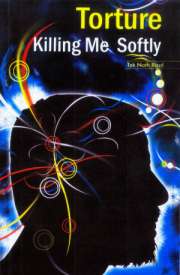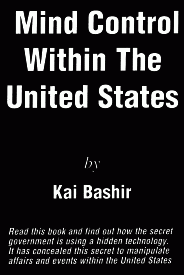Tek Nath Rizal's 2009 Book,
|
December 2009


For information on buying Torture Killing Me Softly, click here: www.apfanews.com/torture-killing-me-softly/
The 2009 book "Torture, Killing Me Softly" by Tek Nath Rizal alleges government mind control torture with secret electromagnetic radiation (EMR) mind control weapons. Tek Nath Rizal was a prominent government consultant to the South Asian country of Bhutan, before he exposed corruption in high places. He became a popular political figure and internationally recognized human rights activist. His book is about his experience of several years of imprisonment in Bhutan with an emphasis on the EMR mind control torture. The U.S. Department of State and Amnesty International regarded Rizal as a political prisoner and won his release from prison. Rizal has written several books, some of which included his accounts of mind control torture. The books have been very successful in South Asia.
Against all odds, he published this book, "Torture, Killing Me Softly." Mindjustice.org extends our deepest thanks for his great effort and sacrifice. I highly recommend this well written, concise and ground breaking book. For the first time, a variety of medical, government and military professionals publicly acknowledge secret EMR mind control weapons for interrogation and torture in prisons and on POWs, prisoners of war. For example Rizal writes:
Dr. Gurung had served in Military for twenty years. He had actually worked for four years in the quarter guard unit where prisoners were kept and the mind control methods were used on them for procuring information and as a form of torture. He was also surprised that how I was alive, even after this torture. He also understood the gravity of my case as he had been well aware of the ill-effects of this kind of torture.
A highlight of the book is a foreword by Dr. Indrajit Rai, a Nepal member of the Constituent Assembly, and an influential conflict/security expert who is often quoted in South Asian newspapers. Rai is director of the British Gorkha College, Nepal, and served fifteen years in the Indian Navy as Lt. Comdr. Rai taught at Army Staff College, Katmandu for seven years. The title of the foreword is, "Mind Control Device on Tek Nath Rizal." Rai described Rizal as one of the "historic political personalities" of South Asia and corroborated Rizal's account of mind control torture, surveillance and targeting, with references to Rai's military sources from his own extensive military background. Rai advocates the banning of mind control weapons.
Rizal's book sounds like a science fiction horror story about torturers using futuristic brain torture tools in a very medieval fashion. But the facts show that it is much more. The U.S. and other major governments have harnessed science and technology to develop secret electromagnetic radiation (EMR) mind control weapons for intelligence purposes, for interrogation and torture, and for neutralizing the enemy without killing. Included below is a list of EMR mind control weapons monitored by the UN for decades.
Rizal's book is one of the most convincing allegations of government mind control targeting in a long line of high profile mind control claims of torture and political repression. Another case is the 1997 book, "Mind Control Within the United States," by Kai Bashir. The book, (available on amazon.com,) is a riveting and chilling account of mind control targeting in another small South Asian nation; Pakistan. Bashir's mother had tutored the sons of Z. A. Bhutto, President of Pakistan.
Book Reviews of Torture Killing Me Softly
Cheryl Welsh has authored a review of the book including two lists for a revealing comparison:
- EMR mind control technologies tracked by the UN and human rights groups since the 1950s.
- High profile cases similar to the case of Tek Nath Rizal.
APFA News also reviews the book and has a link for ordering a copy. Mind Justice hosts a copy of the review.
The Bhutan News Service offers this review. Mind Justice hosts this copy of the review.
The Himalayan Times reviews the book on this page. Mind Justice hosts this copy of the review.
The Nepal Monitor, too, reviewed the book. Mind Justice hosts this copy of the review.